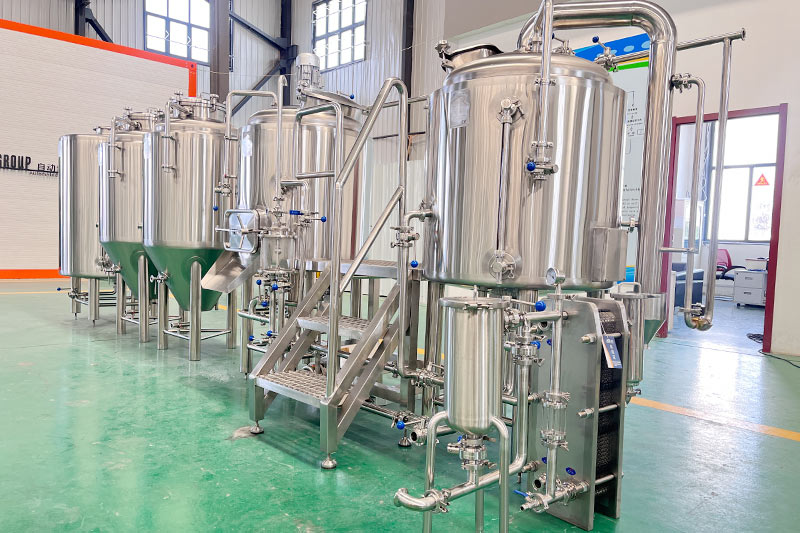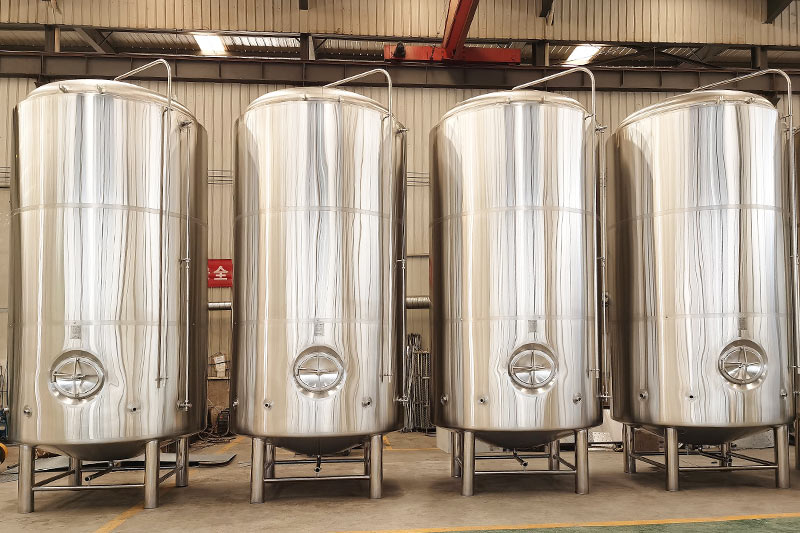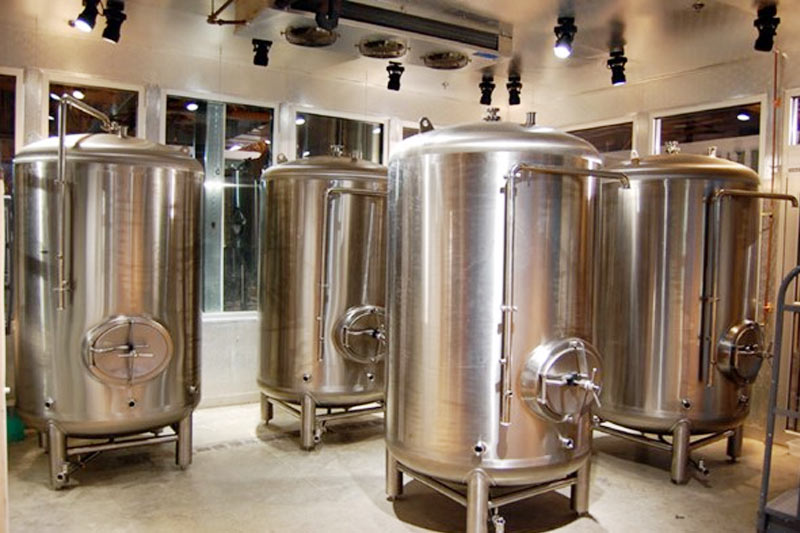Discover how to start your own brewery with the right commercial brewing equipment. Learn about the essential tools, from brew kettles to fermentation tanks, and how decades of experience can guide you in brewing success. Read on to unlock the secrets of efficient beer production and take the first step toward becoming a master brewer!

Why Is Brewing Equipment Essential for Starting a Brewery?
To start a brewery, you need the right brewing equipment. This equipment forms the backbone of your production process, ensuring consistency, quality, and efficiency.
Key Components:
- Brewhouse: The heart of the brewing operation.
- Fermentation Tanks: Where the magic of fermentation happens.
- Bright Tanks: For conditioning and carbonating beer.
- Glycol Systems: To maintain proper temperatures.
Investing in high-quality brewery equipment is crucial for producing good beer consistently. From my experience, having reliable equipment not only improves the brewing process but also saves time and reduces costs in the long run.
What Is the Role of a Brewhouse in Beer Production?
The brewhouse is where the brewing process begins. It’s a combination of vessels where different stages of brewing occur.
Components of a Brewhouse:
- Mash Tun: Where grains are mixed with water.
- Brew Kettle: For boiling the wort.
- Hot Liquor Tank: Stores hot water for brewing.
The brewhouse sets the foundation for your beer’s flavor and quality. Using a well-designed brewhouse, like our Microbrewery Equipment, ensures precise control over the brewing process.
How Do Brew Kettles and Mash Tuns Function?
Brew Kettles:
- Purpose: Boil the wort with hops and other ingredients.
- Features: Equipped with heating elements or steam jackets.
- Importance: Sterilizes the wort and extracts flavors.
Mash Tuns:
- Purpose: Mix crushed grains with water to extract sugars.
- Features: May include rakes and false bottoms.
- Importance: Determines the beer’s body and alcohol content.
By understanding the functions of brew kettles and mash tuns, you can control the beer’s flavor profile and quality.
Why Are Fermentation Tanks Crucial in Brewing?
Fermentation tanks are where yeast converts sugars into alcohol and CO₂.
Types of Fermentation Tanks:
- Conical Fermenters: Allow easy removal of yeast.
- Unitanks: Serve as both fermenter and bright tank.
Benefits:
- Temperature Control: Glycol jackets maintain optimal temperatures.
- Sanitation: Stainless steel construction aids in cleanliness.
Our Conical Fermenters are designed to enhance the fermentation process, ensuring your beer reaches its full potential.
Understanding the Importance of Bright Tanks
Bright tanks are used for beer maturation, clarification, and carbonation.
Functions:
- Conditioning: Allows flavors to develop.
- Carbonation: Adds the desired level of CO₂.
- Storage: Holds beer before packaging.
Using quality brite tanks, like our Bright Tank, helps in delivering clear, crisp beer to your customers.
What Is the Significance of Stainless Steel in Brewing Equipment?
Stainless steel is the industry standard for brewing equipment.
Advantages:
- Durability: Resists corrosion and lasts longer.
- Sanitation: Easy to clean and maintain.
- Temperature Control: Excellent heat transfer properties.
Using 304 stainless steel in equipment ensures that your brewery maintains high hygiene standards and produces consistent quality beer.
How Does a Plate Heat Exchanger Work in Brewing?
A plate heat exchanger cools the wort after boiling.
Process:
- Hot Wort Enters: The wort passes through thin plates.
- Cooling Medium: Cold water or glycol runs on the opposite side.
- Heat Transfer: Heat moves from the wort to the cooling medium.
Benefits:
- Efficiency: Rapid cooling reduces contamination risk.
- Temperature Control: Achieves desired fermentation temperatures quickly.
Integrating a plate heat exchanger into your system is vital for maintaining the quality and flavor of the beer.

The Role of Glycol Cooling Systems
Glycol systems are used to control temperatures during fermentation and storage.
Components:
- Glycol Chiller: Cools the glycol solution.
- Pipes and Valves: Distribute glycol to tanks.
- Control Units: Regulate temperatures.
Importance:
- Precision: Maintains exact temperatures needed for different beer styles.
- Consistency: Ensures every batch meets quality standards.
Our Craft Beer Cooling Chiller Equipment provides reliable temperature control for your brewing process.
What Are the Benefits of Turnkey Brewery Solutions?
Turnkey brewery solutions offer complete packages to start brewing.
Benefits:
- All-in-One: Includes all necessary equipment.
- Customization: Tailored to your specific needs.
- Support: Often comes with installation and training.
Choosing a turnkey brewery simplifies the process of setting up your brewery, allowing you to focus on brewing great beer.
FAQs About Commercial Brewing Equipment
At minimum, you’ll need a brewhouse, fermentation tanks, brite tanks, glycol system, and packaging equipment.
Costs vary based on size and capacity. A small nano brewery equipment setup may start around $100,000, while larger systems can cost upwards of $1 million.
Stainless steel is durable, easy to clean, and doesn’t react with beer, ensuring purity and longevity.
Yes, but be cautious. Used equipment may have wear or contamination risks. Always inspect thoroughly.
BBL stands for “barrel” and is a unit of measurement equal to 31 gallons. It’s commonly used to describe the capacity of brewing equipment.
We provide flexible financing solutions to help you acquire the necessary equipment. Contact us for more details.
Conclusion
Starting a brewery is an exciting venture that requires careful planning and investment in quality commercial brewing equipment. From the brewhouse to the fermentation tanks, each component plays a vital role in producing exceptional beer. With decades of experience, we offer the expertise and equipment you need to succeed in the brewing industry.Our manufacturing plants specialize in crafting high-quality craft brewery equipment tailored to your needs. Whether you’re a seasoned brewer or just starting, we’re here to support your journey toward brewing excellence.
Key Takeaways
- Essential Equipment: Invest in quality brewing equipment like brew kettles, fermenters, and bright tanks.
- Stainless Steel: Preferred material for its durability and sanitation.
- Temperature Control: Utilize glycol systems and plate heat exchangers for precise control.
- Turnkey Solutions: Simplify setup with all-in-one packages.
- Expert Support: Rely on experienced manufacturers for guidance and quality.
Ready to start your brewing journey? Contact us today to explore our comprehensive brewing solutions!
Short Summary
- Brewing Equipment: Essential for starting a successful brewery.
- Brewhouse Components: Including brew kettles and mash tuns, are vital.
- Fermentation Tanks: Crucial for transforming wort into beer.
- Stainless Steel: Offers durability and sanitation benefits.
- Temperature Control: Achieved through glycol systems and plate heat exchangers.
- Turnkey Breweries: Provide a complete solution for new brewers.
Note: For more information on brewery equipment, explore our Nano Brewery Equipment, Microbrewery Equipment, and Beer Brewing Equipment.

